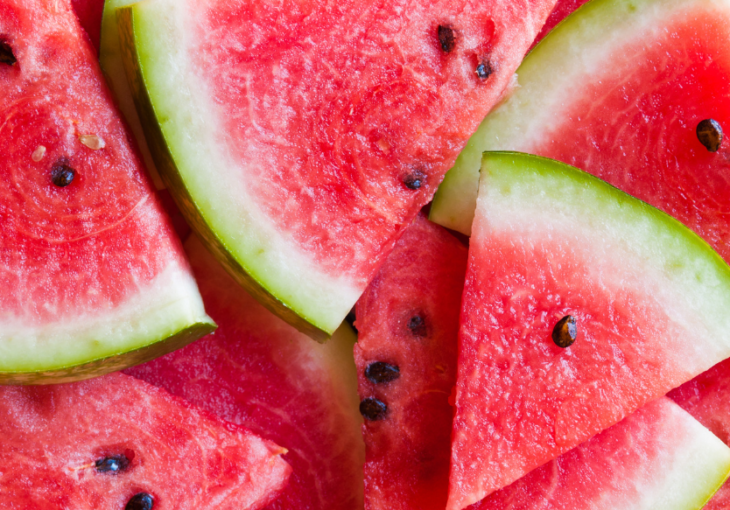August 3 is National Watermelon Day; however, the truth is that watermelon is a summer staple that we love to celebrate all season long! Not only is it delicious but it’s also good for your heart health. It is cholesterol-free, fat-free and sodium-free. Befitting its name, watermelon is about 92% water.
Where watermelon really stands out is in its concentration of certain antioxidants, which regulate cell-damaging free radicals in the body. Watermelon also contains nutrients that support heart health, like magnesium, which helps keep the heartbeat steady and phosphorus, which has a role in the electrical activity of the heart. According to the American Heart Association, fruit is always part of a healthy diet.
It’s also a good source of vitamins C and A (plus beta carotene, which helps produce vitamin A), and it has fair amounts of vitamins B1, B5 and B6. You get all of that for only 46.5 calories per cup.
Lycopene, which gives watermelon its reddish color, is one of those antioxidants, along with vitamins C and A. Lycopene also works as an anti-inflammatory and has been linked to lower stroke risk. It is most abundant in cooked tomato products, but watermelon’s lycopene levels are about 40% higher than raw tomatoes.
It’s watermelon season!
Seasonal eating is defined as including foods in your diet that are harvested in the same season that you are eating them. Much like how flowers bloom at a certain time of year, the fruits and vegetables we eat each have a season where they are at peak performance. Eating seasonally is as simple as knowing what fruits and vegetables are being grown and harvested at what time of year.
In addition, eating seasonally helps you naturally get a broader variety of food in your diet.
Watermelon season is between May and September. That’s when the top four watermelon growing states in the US, Florida, Georgia, Texas, and California, are at their best. The very peak of watermelon season is July and August, that’s when stores are supplied with melons at their best.
The American Heart Association recommends eating seasonal produce. Fresh foods are often less expensive during their harvest season. You may even save money by buying in bulk.
Buying seasonal produce can add zest and flavor to your meals. Eating seasonally ensures that you are eating the food when it is freshest and tastes the best.
A few watermelon recipes from recipes.heart.org:
Watermelon Cake:
Grilled Fruit Kebabs with Balsamic Drizzle:
A brief history of watermelon:
Watermelon (Citrullus lanatus) is a member of the Cucurbitaceae plant family. The group contains a few familiar garden vegetables including cucumber, squash, pumpkin and musk melon. From a usage standpoint, watermelon is consumed as a fruit, but it still is classified as a vegetable.
According to David Trinklein from the University of Missouri, watermelon’s history dates back 5000 years to southern Africa where the tough, drought-tolerant ancestor of watermelon thrived. Although we don’t know the exact identity of this plant, we do know it was prized for its ability to store water and was used by indigenous people in the Kalahari Desert region. Unlike today’s watermelon, it had very bitter flesh.
Did you know that modern-looking versions of watermelons are depicted in ancient Egyptian tombs? Watermelon was being cultivated in India by the 7th century, and by the 10th century it had found its way to China.
Thomas Jefferson grew watermelon at Monticello and, by the early part of our nation’s history, it was being grown by Native American’s from the Mississippi Valley south to Florida. The first cookbook published in the United States in 1796 contains a recipe for pickled watermelon rinds.
A noteworthy advance in watermelon improvement was made with the introduction of seedless watermelons in the 1950s.
Conclusion:
History and science aside, most people just enjoy how the fruit tastes. Superfan Mark Twain wrote, “It is the chief of this world’s luxuries, king by the grace of God over all the fruits of the earth. When one has tasted it, he knows what the angels eat.”
While National Watermelon Day is celebrated on August 3 , we will share fun watermelon-related resources and content throughout the week on Instagram, Facebook and X (Twitter) @ahanewyorkcity!
